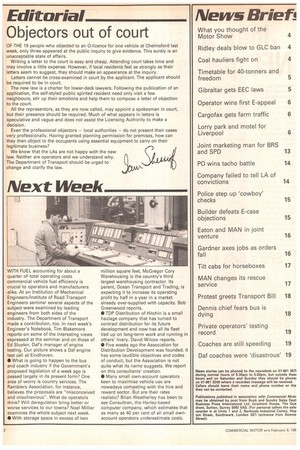Editorial Objectors out of court
Page 4

If you've noticed an error in this article please click here to report it so we can fix it.
OF THE '19 people who objected to an 0-licence for one vehicle at Chelmsford last week, only three appeared at the public inquiry to give evidence. This surely is an unacceptable state of affairs.
Writing a letter to the court is easy and cheap. Attending court takes time and may involve a little expense. However, if local residents feel as strongly as their letters seem to suggest, they should make an appearance at the inquiry.
Letters cannot be cross-examined in court by the applicant. The applicant should be required to be in court.
The new law is a charter for lower-deck lawyers. Following the publication of an application, the self-styled public spirited resident need only visit a few neighbours, stir up their emotions and help them to compose a letter of objection to the court.
All the representors, as they are now called, may appoint a spokesman in court, but their presence should be required. Much of what appears in letters is speculative and vague and does not assist the Licensing Authority to make a decision.
Even the professional objectors — local authorities — do not present their cases very professionally. Having granted planning permission for premises, how can they then object to the occupants using essential equipment to carry on their legitimate business?
We know that the LAs are not happy with the new law. Neither are operators and we understand why. The Department of Transport should be urged to change and clarify the law.


































































































